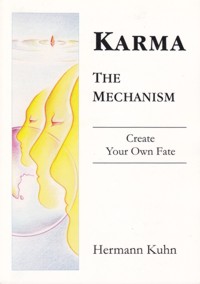
Bahvarambha parigrahatvam narakasyayusah (15)
Excessive infliction of pain and excessive attachment to this world attracts karma that leads to incarnations in 'infernal' regions. (15)Excessive infliction of pain means all unnecessary pain and suffering caused to living beings. It also includes cruel action and killing.
Excessive attachment to this world is possessive clinging to property (objects, beings, status etc.). It includes unrestrained longing for the belongings of others, the acquisition and accumulation of goods that far exceeds our needs. Excessive attachment manifests thoughts like "all this is mine" and a deep feeling of resentment and loss if only a small part of what we regard as our own needs to be parted with.
These excessive actions and attitudes and also revengeful, cruel thoughts and emotions at the time of death[25] lead to birth(s) in the nether, 'infernal' regions. This manifests the deep desire of the respective person for further attachment to matter and for the experience of cruel, revengeful behavior. Since the nether, 'infernal' regions are inhabited by beings with similar attitudes, this desire can be satisfied without disturbing other beings who have different objectives of life.[26]
As soon as this attitude weakens (i.e. when we dissolved the corresponding karma and do not manifest further emotional attachment to this region), opportunities will arise that enable the departure from these areas.
It is important to understand that this denotes no (religious) concept of 'hell' in the sense of 'punishment' or 'eternal damnation', but a mechanism that positions us in exactly those conditions of life that are ideally suited for our desires and the abilities we want to manifest. It is an optional path that everyone defines by his own behavior in the present.
We further tend to regard thoughts and emotions as of little consequence since we experience them in such abundance.
Anything we may feel or think in that 'far away' and supposedly 'brief' moment when we ultimately leave our body, we therefore regard of minor importance for our current life.
Yet the fact that we evaluate this 'moment' as unimportant does not in the least diminish its profound impact on our future conditions of life. The point of our death is an extremely intense experience. Here we condense all unfulfilled desires and all our ideas of what we still would like to experience into one intense feeling, into one intense longing. And this deep longing draws us into exactly that (new) environment that enables us to physically experience the manifestation of these desires in the best possible way.
At the point of our physical death all we only pretended to be, all we only made up before ourselves and others, falls off like a discarded shell. What remains is raw and real yearning deep within us that dynamically attracts exactly those components we still want to experience. This tendency to new or 'renewed' experiences we only shape ourselves through the way we conduct all our current life.
1 - devas - beings residing in celestial areas
2 - narakas - beings residing in infernal areas
3 - human beings
4 - animals and plants.
For someone raised in the Western cultural environment this division - and specially the first two classes - may promptly be relegated to the area of religious fable or to a rather simpleminded higher instance of merit and punishment.
Yet this type of mystical context is not meant by the Tattvarthasutra. The statement refers to the comprehensive classification of life-forms that is described in great detail in the second, third and fourth chapter of the Tattvarthasutra.
Western science - which presently influences most of our concepts of life - is not interested in these areas, does not examine them and therefore cannot seriously state anything about them.
 Hermann Kuhn
Hermann Kuhn
